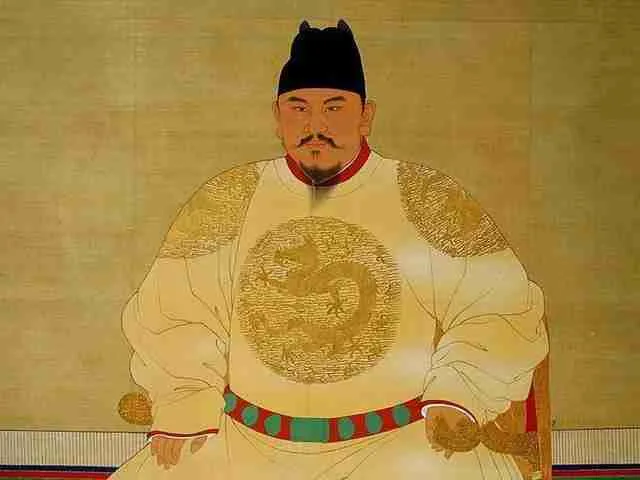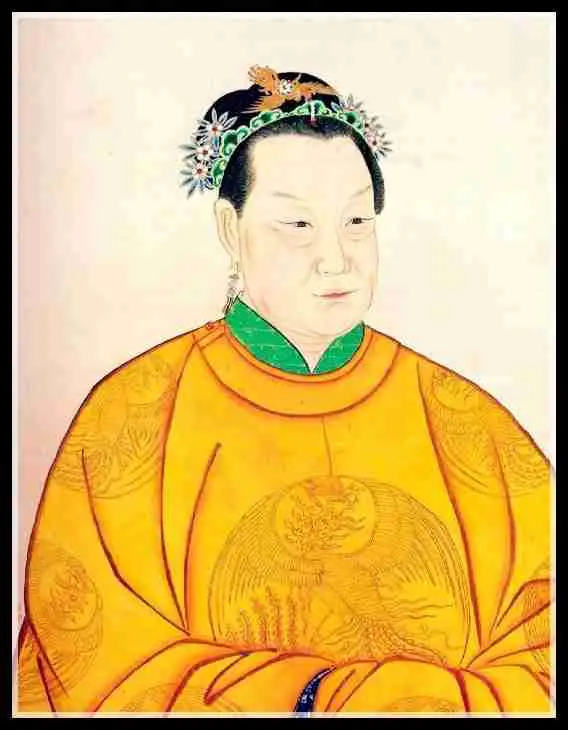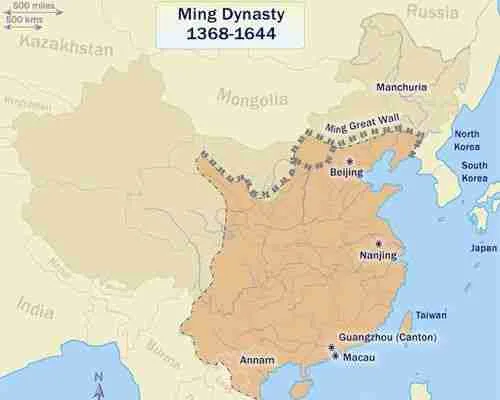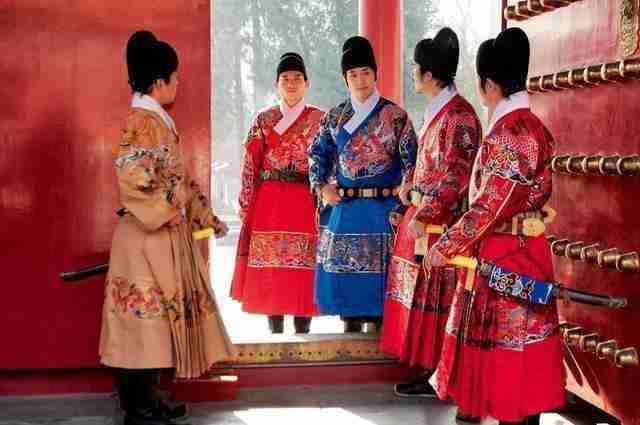Taking time to understand Chinese culture means getting yourself acquainted with the names of the important emperors, as well as the dynasties they ruled, and the impact they had on ancient China, as well as modern China. Zhu Yuanzhang was one of the big names from ancient China, and below is all you need to know about him and his rule.
Who Was The Hongwu Emperor?

Who Founded The Ming Dynasty? Zhu Yuanzhang, also known as Emperor Hongwu, is one of the most renowned names from ancient China. And the main reason for this is the fact that Emperor Hongwu was the founder and the first Emperor of the Ming Dynasty. Emperor Hongwu ruled Ming Dynasty between 1368 and 1398, and thanks to his reign, Ming Dynasty went on to rule China from 1368 to 1644.
He was, however, born Zhu Yuanzhang, a peasant that later became a monk, before turning into a rebel leader, and after many years in the rebellion, became the first emperor of the new Ming Dynasty.
Zhu Yuanzhang was born into a peasant family in 1328, where he was the youngest son out of 7 or maybe 8 brothers. But because of the family’s dire state of poverty, many of his brothers were given away by the family. And in the last 30 years that China was under the rule of the Yuan Dynasty that had ruled between 1279 to 1368, the country faced a great deal of trouble in the form of famine and other natural resources.
But in 1344, when Zhu Yuanzhang was 16 years old, his home was flooded, and afterward, his family died from the disease. Following this misfortune, young Zhu Yuanzhang took shelter in the monastery run by the Buddhists. Unfortunately, the monastery ran out of money soon after he got there, and he had to leave the monastery to beg for food. At the age of 24, he went back to the monastery, where he learned how to read and write. Unfortunately, his taking refuge in the monastery didn’t last too long since the monastery was destroyed by the Yuan troops.
After, Zhu joined one of the local rebel groups and later became part of the Red Turban Army that was guided by Buddhist and Zoroastrian beliefs. Zoroastrianism is known as the western religion which spread throughout Central Asia before the Islam religion.
Before the age of 30, Zhu was appointed the leader of the rebel Red Turban rather large army. And in 1356, his army was able to conquer Nanjing, which was a very important city located strategically in China, specifically, the Yangtze River, as well as the surrounding regions to the south. After this conquest, Zhu made the city of Nanjing his army’s capital. And in the 10 years that followed, Zhu successfully defeated all the other rival armies. And in 1368, in an attack of the Yuan Empire that was based in Dadu, or modern-day Beijing, he won over the Yuan empire, gaining control over the empire as the Yuan Court was forced to flee. However, the Yunnan area remained in Yuan’s rule up to 1380.
how did zhu yuanzhang became emperor
Born in 1328 as a poor peasant in Haozhou, Zhu Yuanzhang went on to become the founder of the Ming Dynasty and the Hongwu Emperor after leading a successful rebellion against the ruling Mongol Yuan Dynasty. Zhu initially joined the rebellion of the bandit leader Guo Zixing and eventually rose to become the leader of the rebel army after Guo’s death in 1355. Zhu’s military victories led him to the Yangtze River delta where he encountered educated men of the gentry class who became his advisers. With their guidance, Zhu learned the essentials of the Chinese language, history, Confucian Classics, and principles of government, and established an effective administration in local areas alongside the military structure.
Zhu’s choice of advisers and his clever ability to adopt sound governmental measures ultimately made him the most formidable leader against the Mongols. He captured Nanjing in 1356, proclaiming himself the duke of Wu, and established an effective administration in the area, granting unused land to the landless peasants, and encouraging agriculture.
Despite acknowledging the Song dynasty pretender Han Lin’er as his superior, Zhu faced unrest in the northern provinces. Various rebels defied the Mongols, and the capable Mongol minister Tuotuo personally led troops to subdue them. The north had a semblance of peace, whereas the south was beyond the Mongol authorities’ control. Chief among Zhu’s rivals for power was Chen Youliang and Zhang Shicheng. Chen Youliang was the self-proclaimed emperor of the Han dynasty and controlled a large portion of central China based in Wuchang. Zhang Shicheng, the self-proclaimed prince Cheng of the Zhou dynasty, operated at Pingjiang in the east.
The decisive naval battle of Lake Poyang in 1363 between Chen Youliang’s huge fleet of war junks and Zhu’s small but swift barges ended with Chen’s death and the destruction of his fleet. Wuchang, Chen’s stronghold, was captured in 1364, followed by the capture of Hubei, Hunan, and Jiangxi provinces. In the same year, Zhu proclaimed himself prince of Wu.
With the south pacified, Zhu sent an army northward to attack the Mongol capital of Dadu (modern-day Beijing) in 1368, and his forces emerged victorious. The Yuan dynasty was overthrown, and Zhu declared himself the Hongwu Emperor, marking the beginning of the Ming dynasty. The Hongwu Emperor implemented a series of reforms to consolidate his power, including the creation of a centralized bureaucracy, a standing army, and the promotion of Confucianism as the state ideology. He also established a system of land tenure that granted land to peasants who would farm it and pay taxes, and he eliminated the practice of granting land to nobles in return for their service.
Zhu Yuanzhang’s rise to power and his establishment of the Ming dynasty was a remarkable achievement that owed much to his intelligence, adaptability, and willingness to learn from the educated class. His reforms laid the foundation for a strong and prosperous China that lasted for several centuries.
Zhu Yuanzhang Wife
His wife was called Empress Ma of the Ma Clan, and she lived between 1352 and 1382.
Empress Ma, also known as Empress Xiaocigao, was the most influential and beloved of Zhu Yuanzhang’s many wives during his lifetime.
Ma, born in 1332, married Zhu Yuanzhang, a peasant rebel fighting against the Mongol-led Yuan Dynasty, in 1352. Known for her charm, wit, and virtue, she soon became Zhu Yuanzhang’s closest confidante and trusted advisor.
While her husband fought for years to topple the Yuan Dynasty and install the Ming Dynasty in China, Empress Ma stood by him the whole time. She frequently accompanied her husband to the battlefield to boost morale and was an integral part of the military campaigns. She was also well-liked for her selfless service to the army, as she tended to the sick and injured on her own time.
By 1368, Zhu Yuanzhang had successfully established the Ming Dynasty, and he had made Empress Ma his empress. She was a key member of the imperial court, assisting in the management of its affairs and advising her husband on matters of state. In addition to being highly respected by her husband and his advisors, she was also well-liked by the public for her wit, intelligence, and political savvy.
It was well-known that Empress Ma was a generous and caring person. She founded numerous institutions like shelters for the homeless, medical clinics, and aid groups to assist the poor and disadvantaged. She cared deeply about the well-being of the people and frequently stepped in to prevent injustice and oppression on their behalf.
After a long and prosperous reign, Empress Ma passed away in 1382 at the age of 50. Zhu Yuanzhang was left completely heartbroken by her passing. Since his loss was so great, he had her posthumously crowned as the “virtuous and kind” Empress Xiaocigao. One of China’s most beloved monarchs, she is remembered for her example as a virtuous and powerful empress.

Zhu Yuanzhang Son
His son was called Zhu Shuang, who got married to Köke Temür’s sister, one of the generals from the Yuan Dynasty in 1371. The most popular of his sons, however, was his 4th son, Zhu Di, who became the Yongle Emperor and ruled the Ming people between 1402 and 1424.
Although Zhu Yuanzhang fathered many children, the eldest son to survive into adulthood was named Zhu Biao, who became the crown prince and heir apparent. But when Zhu Biao passed away at the young age of 36, he left behind a succession crisis that was resolved by the elevation of his younger brother Zhu Di to the throne as Yongle Emperor.
Although Zhu Yuanzhang had many sons, Zhu Di wasn’t seen as a likely heir because of his reputation as a rogue. The death of Zhu Biao, however, made way for Zhu Di to emerge as a formidable rival for the throne, and he eventually succeeded in usurping the throne from his nephew, the Jianwen Emperor.
Capable and ambitious, Zhu Di led the Ming Dynasty through a time of rapid growth and prosperity. He oversaw the building of many of Beijing’s most recognizable landmarks, such as the Forbidden City and the Temple of Heaven, and led military campaigns to expand Ming control over Tibet, Mongolia, and parts of Southeast Asia.
Other reforms, such as instituting a nationwide system of tax collection and introducing paper money, were also implemented by Zhu Di to bolster the central government and spur economic growth. Cultural and intellectual activity flourished during his reign due to his support of the arts. This included the written word, calligraphy, and painting.
Zhu Yuanzhang Tomb
Zhu Yuanzhang’s tomb is in a place called the Ming Xiaoling Mausoleum, located in China’s Nanjing region. The Ming Xiaoling is a renowned mausoleum in China, and it is the tomb of the Hongwu Emperor. It is located at the southern base of Purple Mountain in Nanjing’s eastern suburbs. The mausoleum was the first to be created by the Ming Dynasty, and it is the largest of the imperial mausoleums in China.
On Purple Mountain in Nanjing, Jiangsu Province, China, lies the Ming Xiaoling Mausoleum, the final resting place of Zhu Yuanzhang, founder of the Ming Dynasty. Considered a masterpiece of Chinese architecture and design, it is the largest imperial tomb in China.
Beginning in 1381 during the reign of Zhu Yuanzhang, the Ming Xiaoling Mausoleum was finished in 1405. Situated at Purple Mountain’s base and overlooking the Qinhuai River, the tomb encompasses a land area of over 50,000 square meters.
The Stele Pavilion houses a stone tablet with a eulogy to Zhu Yuanzhang carved into it, and the Ming Gate is a monumental stone archway that serves as the entrance to the complex. The white marble main tomb chamber is buried deep underground. Zhu Yuanzhang and his empress Ma’s remains are thought to be entombed in a large stone sarcophagus there.
The tomb complex was built with feng shui in mind, with buildings and structures strategically placed to promote a sense of calm and balance. In addition, the area is surrounded by a thick forest that is home to numerous endangered plant and animal species.
A major Chinese cultural landmark, the Ming Xiaoling Mausoleum is visited by many people every year. Because of its cultural and historical significance, it was named a UNESCO World Heritage Site in 2003. Visitors can now explore the grand tomb complex and learn about the life and legacy of Zhu Yuanzhang, one of the most important figures in Chinese history, thanks to the careful restoration and maintenance of the site over the years.
What Did Emperor Hongwu Do?

In addition to defeating the Chinese Yuan Dynasty despite being born into a poor family and struggling to stay alive, leading a rebel army, and becoming the first emperor of the Ming people, Emperor Hongwu is also known for making some of the biggest changes to China. For starters, he oversaw the resurgence in the Han Chinese, establishing a dynasty that led to the most significant economic developments and growth, as well as the most flourishing arts scenes.
How Did Emperor Hongwu Die?
Emperor Hongwu died in 1398, aged 69, after ruling the Ming people for 30 years.
In 1398, at the age of 70, Emperor Hongwu (also known as Zhu Yuanzhang) passed away. Different stories exist, but the most widely accepted one is that he passed away from natural causes.
The historical record indicates that Emperor Hongwu’s health had been declining for some time prior to his untimely demise. As his health declined from ailments like arthritis and cataracts, he spent more and more time in bed. In his final years in power, he increasingly relied on his sons and close advisors to run the government in his stead.
Claims that Emperor Hongwu was poisoned or otherwise assassinated by his advisors are unproven. Some scholars speculate that his political opponents or detractors spread these rumors to undermine his reputation.
The death of Emperor Hongwu ended a prosperous and long reign. He set up an effective central government, made major reforms, and encouraged China’s cultural and intellectual development. His grandson, Emperor Jianwen, who ruled after him, also faced significant political challenges.
Hongwu Emperor Achievements
Some of the biggest achievements that the Hongwu Emperor is known for include:
- Change in China’s foreign policies
The emperor decreed an embargo in the maritime policy that would suppress not only the actions of the merchants but also prevent attacks on the merchants by the pirates.
- Policy changes towards the eunuchs
To make sure that the eunuchs didn’t have any ruling power, he changed the policies, and their powers were limited. He also introduced a centralized authority system/ government.
- New Government Structures
By staffing his government with bureaucratic officials that had passed the imperial examinations based on the Neo-Confucian times, the officials of his government were not only well-educated but also very educated and loyal. The courts determined their appointments.
- Issuance of paper currency
The other change initiated by Emperor Hongwu was the introduction or issuance of paper currency. Unfortunately, this ended with a high inflation rate.
- Personal/ Secret Policy

After emerging as the rebel general and being the leader of the Ming people, he grew very suspicious of the people and came up with the private guard called the embroidered Uniform Guard that spied on the people acting as the emperor’s secret police.
- Pro-Peasant Policies
His policies included the reduction of slavery and also pro-peasant policies that reduced starvation. There was also a large number of public works projects that ensured the peasants got to land. The cultivated land also increased a lot, and this led to a huge increase in the population size.
Why Was Zhu Yuanzhang Important?
He was the first emperor of the Ming Dynasty after defeating the red army and enacted policies that changed the economic state and the governance system of the Ming people in a positive direction, setting China up for success.
Zhu Yuanzhang, or Hongwu the Great, was a pivotal figure in Chinese history for a number of reasons.
Using military campaigns, Zhu Yuanzhang brought down the Mongol-led Yuan Dynasty and established the Ming Dynasty as the new ruling power in China. With a reign of over 250 years, the Ming Dynasty became one of China’s most prosperous and significant epochs.
He made some major changes, including: Zhu Yuanzhang, the first emperor of the Ming Dynasty, made a number of changes that would benefit his subjects. He established a strong central government with stringent laws and regulations, and he lowered taxes while encouraging agriculture and trade. He also supported academic pursuits and artistic endeavors, which led to a cultural and intellectual boom in China.
Zhu Yuanzhang’s administrative and leadership abilities earned him a reputation for being formidable. He consolidated power by creating a national government with a strong central authority and by dividing the country into autonomous regions headed by governors. Through his military campaigns, he also helped the Ming Dynasty gain more territory.
Zhu Yuanzhang is revered because his rise from obscurity to found a dynasty is a rousing tale in Chinese history. Many people hold him up as an inspiration because of how he overcame obstacles and accomplished great things.
Zhu Yuanzhang is an important figure in Chinese history due to his leadership during the Ming Dynasty’s early years and the many reforms and accomplishments he oversaw.
huang-ming zuxun
“The Imperial Ming Family Instructions” is a classical work of the Ming Dynasty compiled under the direction of Emperor Zhu Yuanzhang to strengthen the authority of the Ming dynasty and provide guidance to future generations of rulers. Initially titled “Ancestors’ Instructions Record,” it was compiled in the second year of the Hongwu era (1369), completed in the sixth year, revised in the ninth year, and finally revised and renamed “The Imperial Ming Family Instructions” in the 28th year (1395). The work is included in the “Siku Quanshu Cunmu Congshu” collection.
After its publication in the sixth year of the Hongwu era, the “Imperial Instructions to the Ming Dynasty” was not just a formality, but a symbol of imperial power that was to be obeyed like the law. Zhu Yuanzhang made a military order regarding this book: “All my descendants shall obey my command and shall not alter a single word of the laws that have already been established, lest they act foolishly and disrupt what has already been achieved.” Ming Taizu’s message was clear: no emperor or court official in later generations could modify any word of the instructions. So, what exactly did this ancestral text contain that made Zhu Yuanzhang care so much about it?
The “Imperial Instructions to the Ming Dynasty” was first compiled in the second year of the Hongwu era, completed in the sixth year, revised and amended in the ninth and twenty-eighth years, respectively, before becoming the final product that we know today. Let us now take a look at its constituent parts. The instructions consist of thirteen chapters, namely: the first chapter, “Maintaining the Teachings,” “Strict Observance of Ancestral Rites,” “Prudence in Going Out and Coming In,” “Cautious Governance of the Nation,” “Ritual and Etiquette,” “Law and Order,” “Internal Regulations,” “Internal Officials,” “Administrative System,” “Military Guard,” “Camp Management,” and “Supply and Use.”Zhu Yuanzhang proposed a foreign policy towards neighboring countries, designating Korea, Japan, Ryukyu Islands, and Annam as “countries not to be conquered,” which means they will never be invaded.
The first chapter serves as an introduction and outlines Zhu Yuanzhang’s worldview, values, and historical perspectives gained through previous dynasties’ experiences. He starts by talking about the wild people who lived in caves, gradually forming a social system, followed by rules and regulations. Therefore, Ming Dynasty must have a set of everlasting teachings to guide future behavior, only in this way, “Heaven and earth, as well as ancestors, will bless us endlessly,” and both Heaven and ancestors will protect us.
The book contains thirteen chapters:
- The First Chapter outlines prohibitions against the use of cruel torture, the appointment of prime ministers, punishments for imperial relatives who commit crimes, and the country’s policy towards other nations. The following sections focus on issues related to reverence for ancestors and the laws of heaven.
- The Second Chapter stresses the importance of personal conduct, emphasizing frugality and self-restraint.
- The Third Chapter discusses the importance of strict adherence to rituals and ceremonies, emphasizing the need for sincerity and devotion in ancestor worship.
- The Fourth Chapter advises rulers to be cautious in their comings and goings, urging them to avoid rash behavior.
- The Fifth Chapter emphasizes the importance of careful attention to state affairs, emphasizing the need for rulers to have a broad and accurate understanding of their realm.
- The Sixth Chapter focuses on matters of etiquette, outlining procedures for ceremonies, the presentation of gifts, and audience with the royal court, and establishing specific names for the Eastern Palace and for the descendants of princes.
- The Seventh Chapter outlines the laws that govern the punishment of the Crown Prince and other members of the royal family.
- The Eighth Chapter details the proper conduct of the imperial harem and advises that it should not interfere in matters of state.
- The Ninth Chapter provides an overview of the roles and responsibilities of the imperial household and palace officials, as well as their rank and hierarchy.
- The Tenth Chapter outlines the procedures for the awarding of noble titles, establishing that descendants of princes who possess both literary and military skills may be given appointments.
- The Eleventh Chapter describes the structure and organization of the Imperial Guards, who are responsible for protecting the royal family.
- The Twelfth Chapter provides detailed instructions for the construction and maintenance of palaces and other royal buildings.
- The Thirteenth Chapter outlines procedures for the provision of supplies and resources, including the support of local communities during imperial travels and the provision of regular allowances.
The remaining twelve chapters of the book mainly elaborate on Zhu Yuanzhang’s views and opinions on “Respecting Heaven and Ancestors,” which emphasizes the worship of the Heavenly Emperor and the commemoration of ancestors. Influenced deeply by Confucianism, Zhu Yuanzhang still attached great importance to the principles of benevolence and ritual.
Overall, the “Imperial Ming Family Instructions” covers all aspects related to the development of the country, and is the essence of Zhu Yuanzhang’s efforts to ensure that the empire he founded would endure for generations. As the first ruler of the empire, he established the rules for the operation of the empire, and believed that as long as these rules were followed, the Great Ming would last forever. Therefore, he made regulations and stipulated that future generations should not change them arbitrarily.